On February 16, Marvin Kalb gave a speech at the Cosmos Club on the president’s relationship with the press. Below are his remarks, which have been slightly adapted for posting.
The Trump administration has declared war on the American press. It has also declared war on the judiciary, also on the Democratic leadership of Congress, sometimes even on the Republican leadership of Congress. But it is the press, or the media, to use its more fashionable moniker, that is the target of the president’s special fury.
The press, overall, he says, is a “disgrace,…false, horrible, fake reporting.” It is “out of control…fantastic.” Reporters are “very dishonest people,” their coverage he describes as “an outrage.” The New York Times—a “failing” newspaper. CNN—“terrible.” Buzzfeed—“Garbage.” Then, on top of it all, this presidential tweet, dripping with anger and threat:
The FAKE NEWS media (failing @nytimes, @NBCNews, @ABC, @CBS, @CNN) is not my enemy, it is the enemy of the American People!
— Donald J. Trump (@realDonaldTrump) February 17, 2017
Meaning it is not to be trusted. His chief of staff later emphasizing, yes, that is exactly what he means—“enemy of the American people.”
In case, somehow, you did not get the full impact of this message, his Darth Vader shadow, Stephen Bannon, said that the media ought to be “embarrassed and humiliated and keep its mouth shut and just listen for a while.”
Oops! What have we here? Is Trump simply Richard Nixon reborn with a populist message? No. Nixon never thought of himself as God’s gift to the Oval Office; he was a political professional who twisted the law, lied to cover his crime, recognized reality, and resigned in disgrace. Can we now expect Donald Trump to do the same? Should his current problems mushroom into a full-blown crisis? No. Quite the contrary, Trump is a self-absorbed, ego-driven, former reality TV president, narcissistic in many ways, obsessed with cable news (for him, the fount of all knowledge, where, in the words of one columnist, “every issue, every minute, is momentous, every hiccup is a crisis, and every criticism of him is a calumny.”) Trump is an outsider, a real estate magnate, who has never, before now, held political office, never served in the military, and yet managed, in a totally unpredictable presidential campaign, the closest to political madness in recent history, to diminish and demolish 16 other GOP candidates and then, against all odds, it seemed, his favored democratic opponent, Hillary Clinton, leaving the experts in politics, journalism, and diplomacy shaking their heads in utter bewilderment.
“What hath God wrought?” they might now be asking, fearfully anticipating what’s next for America.
[T]here is a vast difference between campaigning, when winning an election defines success, and governing, when balancing competing interests at home and abroad defines success.
Donald Trump, the unlikeliest of presidents in a line running back to George Washington, is now arguably the most powerful politician in the world. Already, consistent with his campaign vows and intertwined with Bannon’s odd visions of an onrushing global apocalypse, he has rushed to transform domestic politics and to frighten the world. If, on any given morning, even before breakfast, he pinches himself, and asks, “Is this real? Is it my finger that is on the nuclear button? Am I really president?,” the answer is yes! Let us hope the president understands, as quickly as possible, that there is a vast difference between campaigning, when winning an election defines success, and governing, when balancing competing interests at home and abroad defines success. As best we can judge it, so soon after his inauguration, Donald Trump’s unorthodox presidency represents a new political ballgame in this country.
Imagine for a moment two teams. One depends only on its rookie pitcher, the one with the wicked curve ball, wild enough to hit a few batters, yet cocky, utterly convinced he has the right stuff to win what he sees as the final inning of the final game of a bitterly fought world series. The other team has a more traditional strategy, dating back almost 250 years. It depends not only on good pitching but also on reliable hitting and solid defense. It depends, in other words, on a triangular democratic distribution of civic responsibility. With President Trump in the White House, the evidence strongly suggests that this concept is now in doubt. The democratic underpinning of our society, on which we have always based our hopes and dreams, is in jeopardy.
“Trumpery,” a term in increasing use, represents a style of governance utterly unfamiliar to the American experience. Creeping, or galloping, authoritarianism may be another term. If there is an explanation for this sudden and disturbing flipflop in American politics, it may lie in the way Trump and his colleagues view media coverage of the presidential campaign that brought them to power. Kellyanne Conway, the president’s ubiquitous spokesperson, who has a ready explanation for anything Trump has ever said or done, claims her boss, during the campaign, was the most “vilified and attacked politician” ever, subject to horrible, “negative coverage.” The press, she says, “suspended the objective standards of journalism,” putting “their finger on the scales” to favor Clinton. They were “unfair,” she goes on, using one of the president’s favorite words. For these reasons, she concludes, Trump has had to fight back, hard. He returns to this theme time and again.
The unfortunate, but unavoidable, result—the ongoing war between the president and the press.
A humble, abbreviated dissent is now in order. When Trump described the Mexicans as “rapists,” the press reported his comment, accurately. When Trump was caught on tape using what he later called “locker room talk” about female private parts, the press reported it, accurately. When Trump, as president, boasted that more people showed up at his inauguration than did at Barack Obama’s, the press reported it, accurately, before adding, that it was not true.
The coverage of Trump, while far from ideal, conveyed essentially an accurate portrayal of the candidate who has now become president. This coverage could be described as negative, but then the fault, dear Brutus, lies with the president, with his words, his actions, his policies, and not with the press, for reporting them.
The president, who sees himself as a herald of truth, rarely needing to admit a mistake, or a lie, naturally, when challenged, doubles-down. He describes facts that are unflattering to him as “fake news.” Likewise, polls that show him as the most unpopular president to enter the Oval Office—he calls those polls “fake polls.” In other words, in his judgment, news can only be judged to be truthful and reliable if it describes him in positive, flattering terms. Over the years, any number of autocrats have felt essentially the same way.
One of Trump’s surrogates, Scottie Nell Hughes, defended the president’s claim that millions of votes had been cast illegally—three to five million, he said. When his statement was challenged as untrue, she said people now have their own way of interpreting whether a fact is true or not. “There’s no such thing, unfortunately, anymore as facts,” she asserted, contradicting the long-established wisdom of the late Senator Pat Moynihan who said you can have your own opinions, but not your own facts. Apparently, the White House assumes, in this “post-fact” world, that the public does not really care if the president lies. They’ll pick and choose whatever “alternative facts” conform to their political views.
“Alternative facts,” by the way, is a Conway concoction.
In this upside-down world, Rush Limbaugh, Fox News, and Breitbart, which Bannon once ran, provide facts for conservatives, and the Times, the Post, and other outlets provide them for liberals—essentially an absurd but popular notion. This notion shatters a guiding principle of American journalism, which, in theory, at least, once stood for the idea that a news outlet neither supports nor opposes a president. Rather it covers the news impartially, fairly, and objectively.
As Adolph Ochs said in 1896, when he purchased The New York Times, he wanted “to give the news impartially, without fear or favor, regardless of party, sect or interests involved.” Trump does not buy this Times formula; he claims most news coverage is biased against him, and this justifies his war against the press. He adds, angrily, that the media is nothing more than an “opposition party,” a kind of political party opposed to his administration.
When President Trump blasts the so-called mainstream media, an almost daily eruption, he clearly is playing to his gallery of supporters—they too hate the media. But his goal is broader and more sinister than that—he seeks to humiliate journalists, to belittle them, to discourage their criticism, to emasculate the “fourth branch of government,” as it was once called, to rob it of the legitimacy it used to enjoy among many Americans. Why? So that, at the end of the day, the president can govern as he wishes, without the judiciary to impose legal constraints and without the media to raise embarrassing questions or to criticize his policies, his family business operations, which scream out for a diligent investigation, and his strange willingness to look the other way when an autocrat like Putin takes aggressive action.
George Orwell’s “1984” has returned to the best seller lists, readers wanting again to appreciate how a make-believe world works. Remember, in this classic, there is a daily mandatory ritual, called “Two Minutes of Hate,” during which time the people turn their anger against the government’s critics, whoever they may be at the moment.
In these troubling times, another classic has jumped back to the best-seller lists—Sinclair Lewis’s 1936 satirical novel, “It Can’t Happen Here.” It focuses on a firebrand demagogue, named Berzelius Windrip, often compared to Trump, who defies the odds and wins the White House. He creates his own facts and his own truth.
President Trump is his own Windrip. He depends almost entirely on tweets and cable TV news to spring new policies on the public and to engage in what he calls “my running war” with the media. This can sometimes be tricky. The other day, he claimed Sweden had suffered a terrorist attack, information he got from Fox News, his source. But it wasn’t true. At his recent news conference, he said he got more electoral votes than any one since Ronald Reagan. But that wasn’t true either.
A virile, unafraid press is the best guarantor of a free society.
The big question of our time, in my judgment, is whether the media, in its daily tussle with an impatient, powerful president has the spunk, the stuff, and the public support, to stand up and say, this far but no further. If the media, for whatever reason, fails to meet this challenge, democracy, as we have known it, will slowly wither away. A virile, unafraid press is the best guarantor of a free society. Weaken the press, and you weaken freedom, and open the door to autocracy.
Let me try to explain.
Checks and Balances
The press in America has never been as strong as the president, who represents the most powerful of the three branches of government. In fact, until the penny press came to define the business in the 1830s and 40s, newspapers were often spokesmen for political parties. That’s how they got their readers and their money. During the Civil War, Abraham Lincoln, no less, imprisoned reporters he said were jeopardizing the war effort. Between Lincoln and Theodore Roosevelt, as America blossomed at the turn of the 20th century, newspapers grew into a big business, exerting meaningful influence on domestic and foreign policy. During World War I, news organizations began to operate—and, equally important, began to think of themselves—as independent actors, and so did the politicians and presidents they covered.
Somewhere between the first and second world wars, the modern era of journalism was born.
Central to that era was the ideal of objectivity, which is so difficult to define. That did not mean, as scholar David Greenberg notes, that values and even bias were then washed into oblivion. It did mean that objectivity became an ideal, a goal, a set of broadly accepted standards that governed daily journalism, whether the newspaper, radio, or television station, was in Los Angeles or D.C. The Supreme Court gradually strengthened the independence of journalism in American society, just the way our founding fathers envisaged “freedom of the press” in the First Amendment to the U.S. Constitution—freedom of the press along with freedom of religion, of speech, of the right peaceably to assemble and petition their government for a redress of grievances. That was how crucially important freedom of the press was to them, and should be to us. Leaders such as Washington and Jefferson, Adams and Madison, at the time of the American Revolution, feared most of all the temptation of politicians to become autocrats if the pressure of governance became too great. They deliberately imposed checks and balances to contain political ambition, one of which was a free and, if necessary, rambunctious press.
In a reporter’s quest for fairness, he or she often tends to balance the good against the bad, thereby risking the creation of a false symmetry or balance.
My late CBS colleague, Eric Sevareid, once said, “Our rigid formula of so-called objectivity have given the lie the same prominence and impact that truth is given; they have elevated the influence of fools to that of wise men; the ignorant to the level of the learned; the evil to the level of the good.” In a reporter’s quest for fairness, he or she often tends to balance the good against the bad, thereby risking the creation of a false symmetry or balance.
There have been other problems, too. During Nixon’s time, in the early 1970’s, the media was targeted as “nattering nabobs of negativism.” I, for one, was put on an “enemy’s list.” My phone was tapped, my office broken into. Nixon even wanted me tailed when I covered the Paris peace talks in 1968, but J. Edgar Hoover, of all people, killed the idea, claiming it would be too expensive.
Still, in Nixon’s effort, as the National Press Club put it, “to control, restrict, ..and discredit the press,” he ran into the buzz saw of a Watergate inquiry, inspired by the old-fashioned legwork of two journalists, Bob Woodward and Carl Bernstein, which ultimately exposed Nixon’s sins and persuaded him to resign.
Twenty years later, in the mid-1990s, when FOX and MSNBC joined CNN in the expanding world of cable news, when the measure of success in journalism migrated from news for the public good to news for owners’ profit margins, when the internet became everyone’s best friend, things dramatically changed. What used to make money for newspapers, namely ads, shifted to the web. Newspaper profits tanked, and many papers went out of business. Even radio and TV news suffered, as financial pressure and technological change obliged journalism to cut its sails, meaning, among other things, to shrink the number of foreign bureaus and obliterate coverage of middle America, where Trump won big, by the way, and stick basically to coverage of East and West Coast events, plus terrorism and the wars in the Middle East.
In this revolutionary period, journalism lost much of its former Watergate glamor. No longer was it the dashing outsider, Robin Hood, fighting the bad guys for the benefit of the good guys; now, it joined the political wars, or seemed to, conservative outlets favoring Republicans; mainstream outlets the Democrats.
For example, in 2016, according to the respected Tyndall Report, the three TV news networks—ABC, CBS, and NBC—helped elect Trump, giving him 1,144 minutes of free coverage compared to 506 minutes for Clinton, more than double the time. On cable news, even more so, with candidate Trump seen and heard anywhere and at any time. The upshot—cable news made more money in 2016 than ever before. Trump was treated as the star of American television. He was often his own TV producer, deciding when and how he would appear, and the networks almost always obliged.
During the campaign and since, Trump has been their meal ticket, attracting the attention of friend and foe alike.
One would imagine that President Trump would have extended an olive branch to the media—it was so instrumental in his victory; but instead he has declared war on the media, the “opposition party,” as he puts it. Sadly the president seems to want, and need, enemies, someone or some group to blame if and when his presidency runs into serious trouble. Part of his problem, in this respect, is that the media does not really want to meet him on the battlefield. It does not want to fight a war; it wants simply to do its job, to cover the president of the United States, which is an essential responsibility for any news organization.
A few days ago, one prominent editor recalled Bannon’s blast that the media “shut up” and “listen” for a while. He said, we will not shut up. We will stand up, and we will report the news. We will listen, as Bannon requests, but when we hear something newsworthy, we intend to report it, whether he likes it or not. That’s our job, and we intend to do it.
It isn’t always easy. Here is one example: Ten days ago, on February 6, TIME magazine featured Bannon on its cover with the headline “The Great Manipulator.” And, on MSNBC, Joe Scarborough showed a clip from “Saturday Night Live,” in which Bannon, dressed as a skeleton in a black cloak, takes over Trump’s desk in the Oval Office and orders the president to a smaller desk, prompting Scarborough to say, “I don’t know. Maybe Bannon is calling the shots.”
This is said between 6 and 7 in the morning. The president, a fan of “Morning Joe,” the popular Scarborough talk show, must have been watching, as he normally does every morning at dawn, because at exactly 7:09 on the same morning, he shoots a tweet to his faithful millions that says:
I call my own shots, largely based on an accumulation of data, and everyone knows it. Some FAKE NEWS media, in order to marginalize, lies!
— Donald J. Trump (@realDonaldTrump) February 6, 2017
To cover this president, good reporters know, by now, that they have to get up early and stay up late. They have to watch what Trump watches on cable news—that is his world, his reality. He does not read books, and is restless during intelligence briefings. He operates mostly on instinct. It is suggested by some editors that reporters keep careful notes on Trump’s fuselage of tweets. These are clues to his thinking at any given moment. They could change at any given moment. He is erratic. And when reporters get a chance at a rare news conference to ask a question, make it simple, direct, and be prepared to challenge whatever Trump chooses to say in response. But, under no circumstances, lose your cool. Always act and be the professional.
It may be too dramatic to say that American democracy rests in the hands of a free, though at the moment uncertain, press. But I believe it does. I believe that the press, and therefore American democracy, will prevail in time.
President Trump is an enormously powerful politician. He hates the press, but can’t seem to live without it.
How can I be so sure? I’m not really. President Trump is an enormously powerful politician. He hates the press, but can’t seem to live without it. It’s his oxygen; it keeps him alive, emotionally and politically.
By their work, every day, every minute of every day, reporters bring the world to us. They deserve our praise and admiration. We depend on them. Young women cover wars in the Middle East, and often they are stringers without any insurance, subject to kidnapping and death. That’s courage.
Resourceful organizations, such as the Pulitzer Center, where I currently hang my hat, help fill the hole left by budgetary shortfalls for foreign coverage. The center gives money to reporters to cover important events all over the world. Last August, for example, helping reporter Scott Anderson fill an entire New York Times Magazine with extraordinary coverage of the Middle East.
At Harvard’s Shorenstein Center, investigative reporting is encouraged, and once a year a hefty prize is given to the news reporter or organization that produces a great series stimulating legislation to improve public policy.
At Dominican University, a small Catholic school near Chicago, a professor, enchanted by the good things journalism does on a daily basis, inspires his honors students to enter this often-criticized craft, and they do, believing it to be honorable, necessary work—as it is. And there are so many other examples of good, valuable journalism on the rise.
President Trump would have been wise to make nice to the press, but I fear he may not be capable of that. Recently, a Post columnist speculated that Trump would not survive four years in the White House. She thinks he will leave after two. Maybe. I then found an interview that Howard Stern, the shock jock, as he’s called, did recently. It was published in The New Yorker a week ago. It said that Stern, who has interviewed Trump many times and knows him quite well, advised his friend not to run for office. “This is something that is going to be very detrimental to his mental health,” Stern said. “He (Trump) wants to be liked, he wants to be loved, he wants people to cheer for him.” Stern added, after noting that criticism of President Trump has been mounting steadily, “I don’t think this is going to be a healthy experience for him.”
Whether it is or not, the battle between Trump and the media continues. Let us remember, Trump, eventually, will be gone, whether in four years or eight. We do have election laws, and this is a nation built on law, not on personal privilege. The press will still be here, the essential pillar of our democracy, carved into the First Amendment to the U.S. Constitution, as valid today as it was yesterday or the day before. A free press, if supported by the public, can still perform miracles.
The Brookings Institution is committed to quality, independence, and impact.
We are supported by a diverse array of funders. In line with our values and policies, each Brookings publication represents the sole views of its author(s).

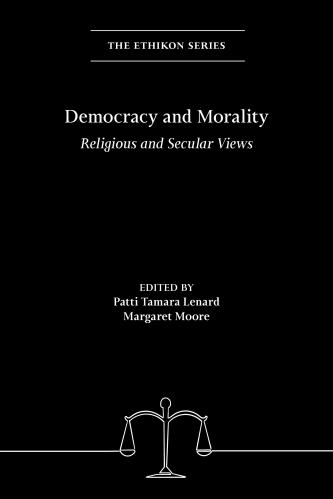
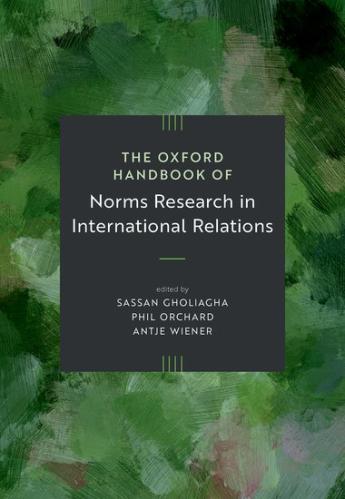
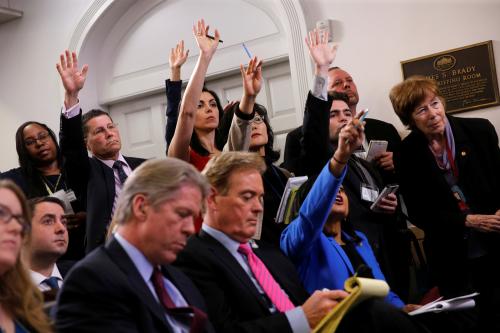
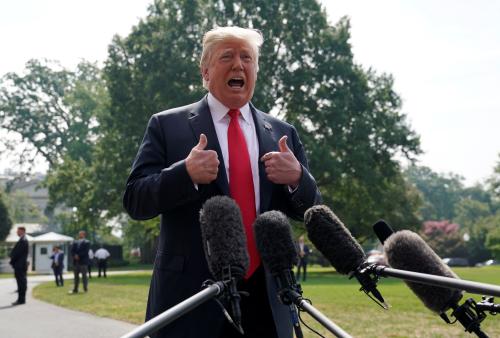
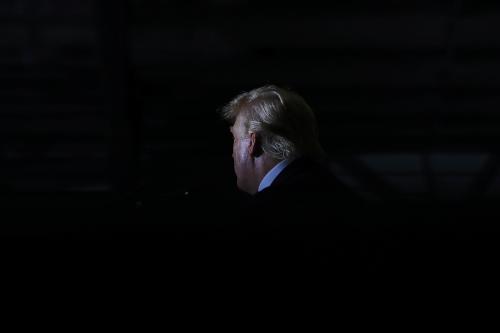
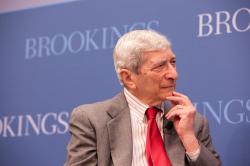
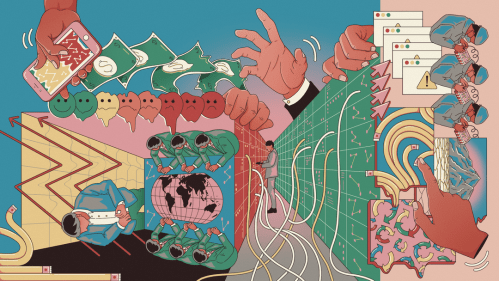
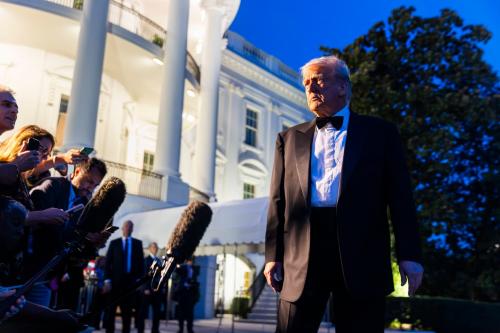

Commentary
Trump’s troubling relationship with the press
February 21, 2017